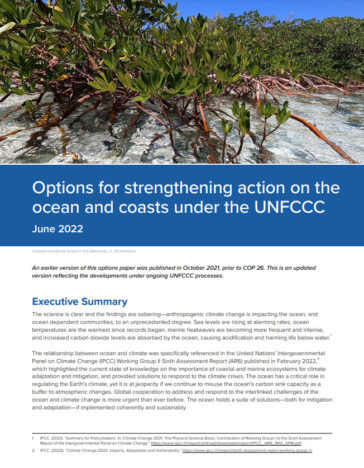Options for strengthening action on the ocean and coasts under the UNFCCC
-
Coastal resilience
-
Coastal wetland conservation
-
Integrated delta management
This options paper summarizes some of the key entry points within existing UNFCCC processes and ongoing negotiations where management actions concerning the ocean and coastal ecosystems can play a productive role in climate action. It is meant to accompany the discussions to be held at the annual Ocean and Climate Change dialogue, starting at SB 56 (June 2022), and at COP 27.
The science is clear and the findings are sobering—anthropogenic climate change is impacting the ocean, and ocean dependent communities, to an unprecedented degree. Sea levels are rising at alarming rates, ocean temperatures are the warmest since records began, marine heatwaves are becoming more frequent and intense, and increased carbon dioxide levels are absorbed by the ocean, causing acidification and harming life below water.
The relationship between ocean and climate was specifically referenced in the United Nations’ Intergovernmental Panel on Climate Change (IPCC) Working Group II Sixth Assessment Report (AR6) published in February 2022, which highlighted the current state of knowledge on the importance of coastal and marine ecosystems for climate adaptation and mitigation, and provided solutions to respond to the climate crises. The ocean has a critical role in regulating the Earth’s climate, yet it is at jeopardy if we continue to misuse the ocean’s carbon sink capacity as a buffer to atmospheric changes. Global cooperation to address and respond to the interlinked challenges of the ocean and climate change is more urgent than ever before. The ocean holds a suite of solutions—both for mitigation and adaptation—if implemented coherently and sustainably.
Despite advancements in recent years, there are still numerous opportunities to strengthen ocean-climate action at the national and international level. At COP 26, Parties requested that the Chair of the Subsidiary Body for Scientific and Technological Advice (SBSTA) hold an annual dialogue, starting at the fifty-sixth session of the SBSTA (June 2022), to strengthen ocean-based action. Additionally, Parties invited the relevant work programs and constituted bodies under the UNFCCC to consider how to integrate and strengthen ocean-based action in their existing mandates and work plans. This outcome presents a key opportunity for Parties and partners to transition from ‘making the case for’ to ‘how to deliver’ concrete actions for coastal and marine ecosystems under the UNFCCC.
This paper identifies specific steps and recommendations for advancing ocean action under the UNFCCC, in response to the invitation for “relevant work programs and constituted bodies under the UNFCCC to consider how to integrate and strengthen ocean-based action in their existing mandates and work plans and to report on these activities within the existing reporting processes, as appropriate” (1/CP.26).
An earlier version of this options paper was published in October 2021, prior to COP 26. This is an updated version reflecting the developments under ongoing UNFCCC processes.

